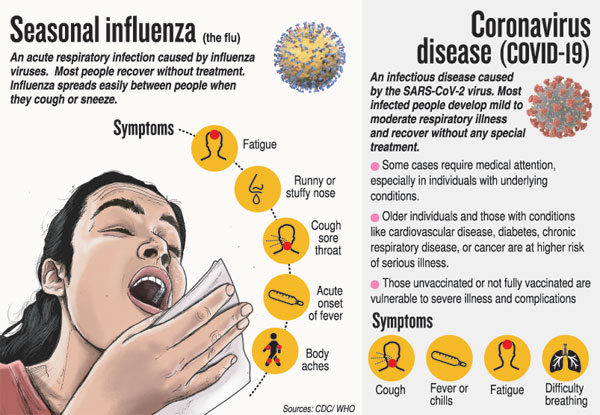News
Bugs on the rampage
View(s):- Answer is ‘point of care testing’ and ‘targeted treatment’
By Kumudini Hettiarachchi
The need is great for ‘point-of-care testing’ and ‘targeted treatment’ for the numerous respiratory infections doing the rounds, as Sri Lanka is lashed by heavy rain.

Dr. Neranjan Dissanayake
This is the fervent appeal of the President of the Sri Lanka College of Pulmonologists, Dr. Neranjan Dissanayake who is hearing concerns over cases of severe illness and also death due to pneumonia. He is a Consultant Pulmonologist (Respiratory Physician) attached to the Kalutara Teaching Hospital & District Chest Clinic.
An infection which can hit either one or both lungs, pneumonia could be caused by a virus, bacterium or fungus, leading to a swelling (inflammation) of the lungs, as well as fluid or pus collection.
Explaining that in discussions with colleagues there has been an indication of an increase in pneumonia cases in the past 2-3 weeks, Dr. Dissanayake says respiratory infections seem to be due to a “mix” of micro-organisms. A majority of infections are possibly caused by Influenza, while there is also a possible rise in COVID-19 cases and the circulation of other viruses such as para-influenza and Respiratory Syncytial Virus (RSV) and bacteria.
The usual trend is for people to get a primary viral infection followed by a secondary bacterial infection. Viral pneumonia caused by Influenza or COVID-19 could also lead to severe disease, he says.
According to him those who could have a higher tendency to go into severe disease include the vulnerable groups of very young and very old, expectant mothers, those who are immuno-compromised (including cancer and transplant patients) and those who have chronic diseases linked to the lungs including severe asthma or other organs and comorbidities.
These are also the groups whose immunity is “down” who would be more susceptible to secondary bacterial infections from gram-positive organisms such as streptococcus and staphylococcus and gram-negative organisms such as pseudomonas and coliforms. They could also be vulnerable to fungal infections, it is learnt.
Citing examples of those who had not been fully vaccinated against COVID-19, he says that they have complications including COVID-19 pneumonia and heart issues, making them very ill.
Literally peeking into a home in Sri Lanka, Dr. Dissanayake says that commonly elderly grandparents look after small children who may be attending nursery or lower classes. Then there may be adolescents also in school and some adults who go out to work. Those going out of the home would usually unwittingly bring bugs into the home.
“Even though, these small children, adolescents and adults who go to school or work may catch the viruses, they may either be asymptomatic (having no signs or symptoms of a disease) or mildly symptomatic (mild fever, nasal congestion and runny nose). However, they would be infectious and pass it onto the elderly or immuno-compromised in their home,” he adds.

| Advice from Dr. Neranjan Dissanayake Keep away from those who are ill in your home, especially if you are in a vulnerable group. The infectious period would generally be at least until the symptoms disappear. Outside the home, it would be better for the vulnerable to avoid crowds and closed When venturing out of home, it may be advisable to wear a mask if you are Resort to hand hygiene – washing hands frequently or using sanitizer when out of home. If you are young and fit and have only mild fever and symptoms, take measures to prevent the spread of infection through you. Even if you have mild symptoms but are in a vulnerable group, seek medical attention immediately, so that your infection can be diagnosed and provided apt treatment. Ask your doctor about vaccination availability, if you are in a vulnerable group, and keep your vaccination status updated.
| |
| Warding off severe illness & death and keeping at bay super-bugs Focusing on issues faced when treating patients with respiratory infections, Dr. Neranjan Dissanayake says that it is important to identify the specific microbial or organism as well as the patient’s sensitivity to anti-microbials (anti-virals, antibiotics and anti-fungals). “This facilitates targeted and effective treatment with fewer side-effects, at minimum cost and less risk of developing anti-microbial resistance (AMR),” he said, pointing out that in certain instances, if the relevant reports can be received in 24 hours, such effective treatment would reduce the severity of the infection and also prevent patient deaths. With regard to Influenza and COVID-19, Dr. Dissanayake says that there are anti-viral therapies which should be prescribed by a clinician for certain vulnerable groups such as expectant mothers and those who are immuno-compromised, to prevent severe disease. Such therapies are not for everyone who comes down with Influenza or COVID-19 because these viral infections are self-limiting and take their course. These therapies should not be doled out over-the-counter without prescription. “Antibiotics, meanwhile, are to fight bacterial infections and should not be dispensed for viral infections,” he says, adding: “Otherwise we would have a major crisis on our hands – with AMR, where super bugs (both viruses and bacteria) would evolve. Then we would be in serious trouble.”
|
The best way to say that you found the home of your dreams is by finding it on Hitad.lk. We have listings for apartments for sale or rent in Sri Lanka, no matter what locale you're looking for! Whether you live in Colombo, Galle, Kandy, Matara, Jaffna and more - we've got them all!

